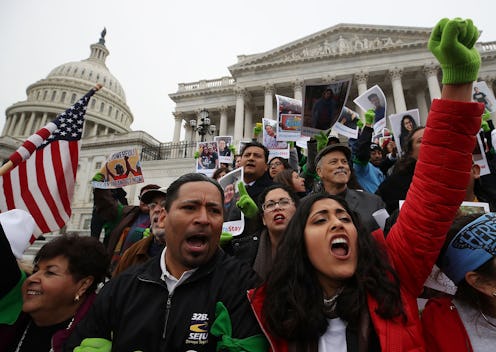
On Tuesday, a U.S. District Judge in San Francisco, William Alsup, blocked the Trump administration from ending DACA, the Deferred Action for Childhood Arrivals program. The program allows young, undocumented individuals in the United States to receive protection from deportation and the right to work. Alsup ruled on Tuesday that the program must continue until any litigation related to it has unfolded.
President Trump ended the DACA program, which was created under the Obama administration, back in September. In ending the program, he called on Congress to come up with litigation to find a solution for the Dreamers — young, undocumented immigrants who arrived in the U.S. as children. Trump had given Congress until March to come up with related litigation, as he mandated that any DACA permits that expired after March 5 could not be renewed (for those whose permits expired before that time, no renewal applications were accepted after Oct. 5).
Since Trump rescinded the program, several states and organizations have sued the Trump administration, claiming that, according to the New York Times, ending the program was "arbitrary and done without following the proper legal procedures."
Judge Alsup's ruling indicated that DACA protections must remain in place until these lawsuits are resolved. Alsup noted that the government now must process renewal applications for any previous recipients of the program. However, the government does not have to accept new DACA applications for individuals who have never before been covered.
According to Reuters, Alsup touched on the implications of ending DACA when making his ruling regarding the importance of allowing renewals until lawsuit resolution. As the judge noted:
DACA gave them [Dreamers] a more tolerable set of choices, including joining the mainstream workforce ... Now, absent an injunction, they will slide back to the pre-DACA era and associated hardship.
Alsup also critiqued the Trump administration for not assessing the impact of ending DACA on those who had been recipients of the program, saying:
These individuals had submitted substantial personal identifying information to the government, paid hefty fees, and planned their lives according to the dictates of DACA ... The administrative record includes no consideration to the disruption a rescission would have on the lives of DACA recipients, let alone their families, employers and employees, schools and communities."
Around 800,000 people are recipients of DACA, and, prior to Alsup's injunction, could have faced deportation when the program was slated to end on March 5. As Bloomberg reported, California's Attorney General, Xavier Becerra, noted that Alsup's ruling constitutes “a huge step in the right direction”for the Dreamers. Bercarra added, “America is and has been home to Dreamers who courageously came forward, applied for DACA and did everything the federal government asked of them."
The Trump administration has not yet commented on Alsup's ruling.
As the New York Times reported, the immediate legal effects of the judge's ruling remain unclear. As the paper explained, the Trump administration could immediately appeal the judge's ruling in hopes of stopping the injunction from taking effect and allowing the termination of the program to continue. However, an appeal and subsequent ruling could also be appealed, meaning that the DACA issue could potentially make it all the way to the Supreme Court, leaving the status of the program in question for a significant period of time.
Overall, at the very least, Alsup's ruling has provided temporary relief for DACA recipients, who are now able to renew their protected status and ensure that their right to work is maintained. Time will tell how the long-term implications of Alsup's rulings and of future lawsuit decisions play out and how they will affect the Dreamers.